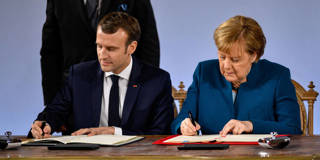By signing the Treaty of Aachen, German Chancellor Angela Merkel and French President Emmanuel Macron have taken an important step toward firming up the Franco-German partnership at the heart of the European project. But insofar as the pact excludes all other EU member states, it risks deepening Europe's divisions even further.
BERLIN – The recent signing of the Treaty of Aachen invites us to reflect on how the Franco-German partnership’s role in Europe has evolved since the two countries first adopted a bilateral friendship pact, the Élysée Treaty, in 1963.
At the heart of the Treaty of Aachen is a plan to form a European Defense Union. This is not a new idea. Similar proposals were discussed as far back as 1950, when the United States was being drawn into the Korean War. The US called for West Germany to be brought into the fold of a new European Defense Community. But in 1954, the formation of a defense union – under the Pleven Plan and the Treaty of Paris – was rejected by the French Parliament, which feared becoming too dependent on the US.
Still, during the negotiations over the Élysée Treaty less than a decade later, French President Charles de Gaulle saw an opportunity to push for more Western European independence from the US. Hence, the original text of the treaty made no mention of France or Germany’s relationship to the US, the United Kingdom, NATO, or any other important international agreements. But this omission did not go unnoticed. Bowing to pressure from President John F. Kennedy, the German Bundestag added a preamble calling on France and Germany to cooperate closely with the US and the UK.

BERLIN – The recent signing of the Treaty of Aachen invites us to reflect on how the Franco-German partnership’s role in Europe has evolved since the two countries first adopted a bilateral friendship pact, the Élysée Treaty, in 1963.
At the heart of the Treaty of Aachen is a plan to form a European Defense Union. This is not a new idea. Similar proposals were discussed as far back as 1950, when the United States was being drawn into the Korean War. The US called for West Germany to be brought into the fold of a new European Defense Community. But in 1954, the formation of a defense union – under the Pleven Plan and the Treaty of Paris – was rejected by the French Parliament, which feared becoming too dependent on the US.
Still, during the negotiations over the Élysée Treaty less than a decade later, French President Charles de Gaulle saw an opportunity to push for more Western European independence from the US. Hence, the original text of the treaty made no mention of France or Germany’s relationship to the US, the United Kingdom, NATO, or any other important international agreements. But this omission did not go unnoticed. Bowing to pressure from President John F. Kennedy, the German Bundestag added a preamble calling on France and Germany to cooperate closely with the US and the UK.